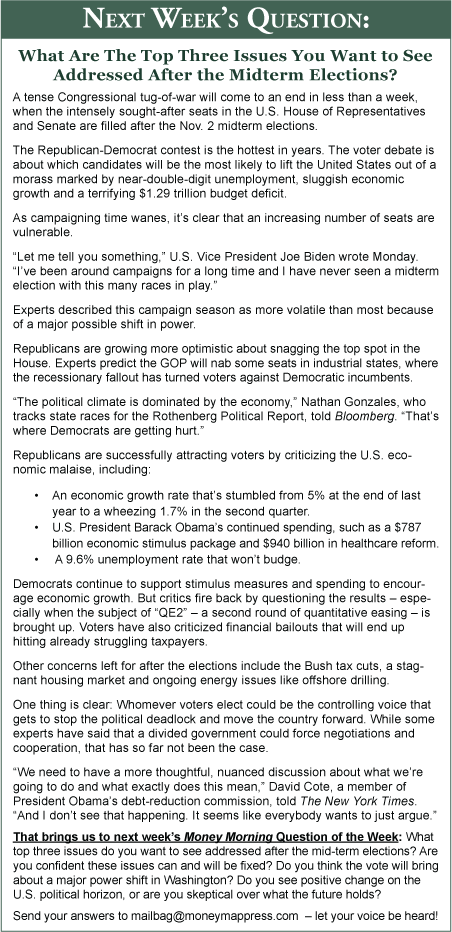A potentially crippling crisis is flashing through the banking industry and threatening to derail the already struggling housing market and U.S. economic recovery.
Dubbed "Mortgagegate" - a nod to the earlier scandal-ridden crisis touched off by Watergate - this latest crisis involves such big lenders as Bank of America Corp. (NYSE: BAC), Citigroup Inc. (NYSE: C) and GMAC LLC (NYSE: GMA), which are alleged to have conducted negligent foreclosure practices.
Money Morning Contributing Editor Shah Gilani warned about the allegedly fraudulent business practices employed by lenders and their hired "robo-signers" that led to thousands of questionably reviewed foreclosure documents.
But Gilani said the headlines aren't telling the full story.
"On the surface, the problem looks like foreclosures have been conducted based on improperly processed paperwork. That is a gross understatement," wrote Gilani.
Besides failing to correctly review documents, banks and lenders also formed a company called Mortgage Electronic Registration Systems (MERS) to act as the nominee for many mortgage lenders. MERS in turn could charge a fee whenever changing the titleholder on a mortgage, collecting money that would normally go to the local government.

Now lawsuits are popping up around the country against MERS - one alleges that MERS owes California as much as $60 billion to $120 billion in unpaid land-recording fees.
Banks last week fought back against claims that their foreclosure processes were negligent, and ended a foreclosure moratorium in states where court appointments were not necessary.
Bank of America said it would resume 100,000 foreclosures in 23 states, but said it is still reviewing cases in 27 others that don't require a judge's approval. The bank said initial "thorough" reviews had turned up no errors in processing.
But while banks contend that the early fears over Mortgagegate were overblown, consumer advocates and lawyers wonder how any bank could conduct a complete review of the documents so quickly. Many state attorneys general are skeptical about lenders' actions and the White House announced last week that a task force would be investigating the foreclosure process, as would the Federal Housing Administration (FHA).
"We've been in discussions with some of the major servicers, and as part of that they've assured us that they are fixing this problem, but we're not just going to take their word for it," Patrick Madigan, a spokesman for Iowa Attorney General Tom Miller, told The Wall Street Journal.
Lawyers are claiming their clients have evidence that mandatory foreclosure documents were lost or thrown out.
"This wasn't just a simple little mistake of forgetting to dot the 'i,' " Peter Ticktin, a lawyer in Deerfield Beach, Fla., told The New York Times. "There was a whole system put in place to make false affidavits. How are they going to erect a new system to do 102,000 affidavits unless they are going to use the same old law firms to make a second generation of bad affidavits?"
While lawyers are seeking clients who might have a case against lenders, bondholders are also fighting against banks to recover losses on mortgage-bond deals with flawed paperwork, and real estate agents are watching sales fall by as much as 60% due to properties tied up in foreclosure.

"[T]he odds that a financial tsunami will result from Mortgagegate are building each day," said Gilani. "If this storm strikes with its full fury, it could be the kind of credit-crisis aftershock that undermines the tentative handhold that the U.S. recovery is so desperately clinging to."
This prompted last week's installment of the Money Morning "Question of the Week": How will Mortgagegate affect you and your investments and financial assets? Has a fatal flaw been exposed in the foreclosure process that will spark a "financial tsunami"? How can the foreclosure process be changed to ensure less negligence and more fairness and efficiency?
The following responses share a general concern for banks' behavior and the serious nature of the U.S. Mortgagegate issue.
A Chance to Go After Banks
Although Mortgagegate should cause a severe hit to the bottom lines of the major banks, I suspect that they will once again buy off enough Congressmen and senators, as well as other public officials, to avoid suffering any major expense, where "major expense" is defined as a monetary loss greater than the bonus pool for that year.
That said, the most hopeful aspect that I see is that so many of the problems that the banks face will be played out in state courts, rather than at the federal level. Given the rising tide of anger that is directed against the banks, at least some states will not be bought off, and thus there may be a real possibility of cracking some of them open, and even bringing criminal charges against some senior bank officials who until now have escaped even investigation, let alone indictment.
At another level, the states may see here the opportunity to go after the banks for fees and fines having to do with the registration and transfer of mortgages and notes that were not properly filed and handled. Given that the states are facing very serious shortfalls, they may see this as manna from heaven, and really put the squeeze on the banks as the banks try to get their paperwork in order so that they don't get thrown out of court when they try to foreclose.
Regardless, it will be interesting to watch how this plays out.
- Gordon F.
Appalled!
Foreclosure is a legal process and I am both surprised and appalled by those who dismiss the whole issue as a paperwork error. If a judge is going to order that anyone lose his house, I want the law allowing that seizure complied with.
Imagine if the same process were used in criminal and crime scene investigations reflected the same sloppiness.
- db
Wary of Banks' Behavior
I am in real estate sales and I know for a fact that banks are playing games with people who are trying to request modification. Banks are saying over and over again that the documents they needed were never received, even when we have sent it many, many times over, by e-mail, by fax, by overnight mail. One hand does not know what the other hand is doing in the banking service, but they are fast in foreclosure.
Short sales are even worse; it takes them over a year to respond. They should really be audited on how they conduct their modification and foreclosure procedures. People that qualified for modification are very often denied with no reason given, that in itself is fraud.
- Marie S.
Stunning - and Scary
Truly stunning are the only words to describe this latest mortgage crisis. The fact that MERS unilaterally changed the land and property title system with apparently no checks and balances other than the checks that went into the hands of bankers to fatten their personal balances is criminal. This is right out of a Francis Ford Coppola novel.
Too big to fail? The banking system or the United States? If we keep going down this road I fear the banking system will out live the United States as we know it. Time to bite the bullet, be honest and address these structural imbalances for what they are and if that means letting these behemoths fail so be it. All the quantitative easing in the world is not going to remedy greed and corruption.
- Jim M.
A U.S. Economic Shift
There will be some fallout. However, Congress and the U.S. government can't get anything right and can't manage their own houses let alone regulate the banking system to the point where things like this no longer occur. A paradigm shift in the U.S. economy has occurred. Housing is no longer going to support the U.S. economy as it once did. Homeowners used their homes to refinance and pull out equity. They then spent the money on cars, boats, vacations, and other consumer spending. This was unsustainable in the first place. Now, the housing market has crashed. It will take years for some sort of balance to return. And, the more Congress and government try to intervene, the longer it's going to take.
Never again will homeowners be able to use their homes as ATM machines as they once did. As to U.S. banks, the big ones will survive. They are a component of the international banking cartel.
- Owen K.
[Editor's Note: Thanks to all who responded to last week's "Question of the Week" feature regarding the "Mortgagegate" crisis. Be sure to answer next week's question: What top three issues do you want to see addressed after the midterm elections? Are you confident these issues can and will be fixed? Do you think the vote will bring about a major power shift in Washington? Do you see positive change on the U.S. political horizon, or are you skeptical over what the future holds? ?
Send your answers to
Is there a topic you want to see covered as a "Question of the Week" feature? Then let us know by e-mailing Money Morning at [email protected]. Make sure to reference "question of the week suggestion" in the subject line. We reserve the right to edit responses for length, grammar and clarity.
Thanks to everyone who took the time to participate - via e-mail or by posting their comments directly on the Money Morning Web site.]
News and Related Story Links:
- Money Morning:
What You Don't Know about "Mortgagegate" Could Crush the U.S. Banking System - The Wall Street Journal:
Banks Restart Foreclosures
- The New York Times:
Largest Bank Will Resume Foreclosure Push in 23 States - Money Morning News Archive:
Question of the Week Feature


